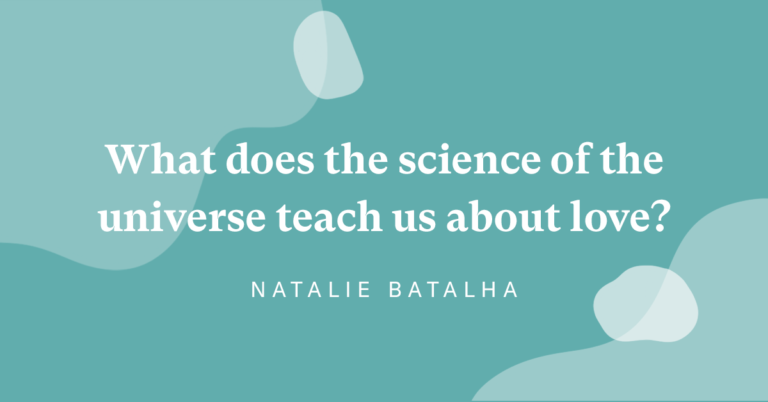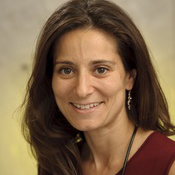Natalie Batalha
A Planetary Sense of Love
Astronomer Natalie Batalha embodies a planetary sense of what “love” is and means. She says her experience searching the universe for exoplanets — earth-like bodies beyond our solar system that could harbor liquid water and life — fundamentally shifted how she thinks about the human experience on this planet. “You see the expanse of the cosmos, and you realize how small we are and how connected we are,” she says. “And that what’s good for you has to be good for me.”

© All Rights Reserved.
Guest

Natalie Batalha is a professor of astronomy and astrophysics at the University of California at Santa Cruz. She served as the project scientist for NASA's Kepler mission from 2011 to 2017.
Transcript
[music: “Sun Will Set” by Zoë Keating]
Krista Tippett, host: I’ve had hundreds of big conversations, and my conversation partners share wisdom I carry with me wherever I go. The astronomer Natalie Batalha embodies a planetary sense of what “love” is and means. She has searched the universe for exoplanets — earth-like bodies beyond our solar system that could harbor liquid water and life. And she is so warm and joyful as she takes this work into her life as a human on earth.
This is Becoming Wise. I’m Krista Tippett.
Ms. Tippett: Here’s a way you’ve written about — just some language you’ve used. “What we observe out there is that nature is creative, prolific, robust.” You also bring words like “love.” It’s not that you’re confusing these things with your science or conflating them, but I sense that this life of discovery that you’re involved in does bring you back to think about something like love differently — that it informs and somehow infuses your thinking about that. So talk to me about that.
Natalie Batalha: Yeah. This has been a surprise to me, actually, that my perspective on love has been so informed by science, but it has. It’s been fundamentally shifted. And then I read other scientists who’ve had the same perspective, and it all kind of makes sense. Carl Sagan’s quote — ”For small creatures such as we, the vastness is bearable only through love.” Love, this idea, is this moving force. It just permeates our history, our culture. I’ve equated it to this analogy of dark matter — 95 percent of the mass of the universe being something we can’t even see, and yet it moves us. It draws us. It creates galaxies. We’re moving on a current of this gravitational field created by mostly stuff that we can’t see. And science has given me that perspective, but also in very logistical, tangible, practical ways. When you study science, you step out of planet Earth. You look back down at this blue sphere, and you see a world with no borders. You see a tiny mote of dust suspended in a sunbeam. You see the expanse of the cosmos, and you realize how small we are and how connected we are and that we are all the same and that what’s good for you has to be good for me.
Ms. Tippett: Was there a moment, or did something happen, where you first realized you were thinking about love the way you were thinking about dark energy?
Ms. Batalha: Oh, my goodness.
Ms. Tippett: I mean, because it’s a really interesting connection. Also it changes the way you think about love. It is an energy, right? It’s not just a feeling inside you.
Ms. Batalha: Certainly, with my own personal experiences, being middle-aged and having raised four children …
Ms. Tippett: I know. You have four children.
Ms. Batalha: I have four children. [laughs] And just going through life and all of life’s challenges and adversity and losing people that we love and all of those things make us think about love. We need to be loved and to love to be happy. Studying science, you realize the connectedness of all things. We are stardust, and here I am, this bag of stardust, and it took how many billions of years for the atoms that make up my body to come together and make this being that’s able to take a conscious look at the universe. I am the universe, and I’m taking a look at myself through these senses that I have, and that is an amazing thing.
Ms. Tippett: For you, that’s such a concrete statement. Somebody else could say that, and it might seem a little flaky, but you really know what you’re talking about [laughs]. You’ve discovered the first rocky planet and things like that. You really know these things.
Ms. Batalha: Yeah. Well, no, that’s a good point. I don’t necessarily mean it in a hippie, flowers-in-my-hair kind of way. It’s easy to say all these fluffy philosophical words that make us all warm and fuzzy, but there are really practical connections. There are things that I do see that are real, that are part of what we’re discovering.
[music: “Sun Will Set” by Zoë Keating]
Ms. Tippett: Natalie Batalha is a professor of astronomy and astrophysics at the University of California at Santa Cruz. She served as the project scientist for NASA’s Kepler mission from 2011 to 2017.
Becoming Wise is produced at On Being Studios, which is located on Dakota land. Our team is Marie Sambilay, Lily Percy, and Chris Heagle. And our theme music is provided and composed by Zoë Keating.







Reflections